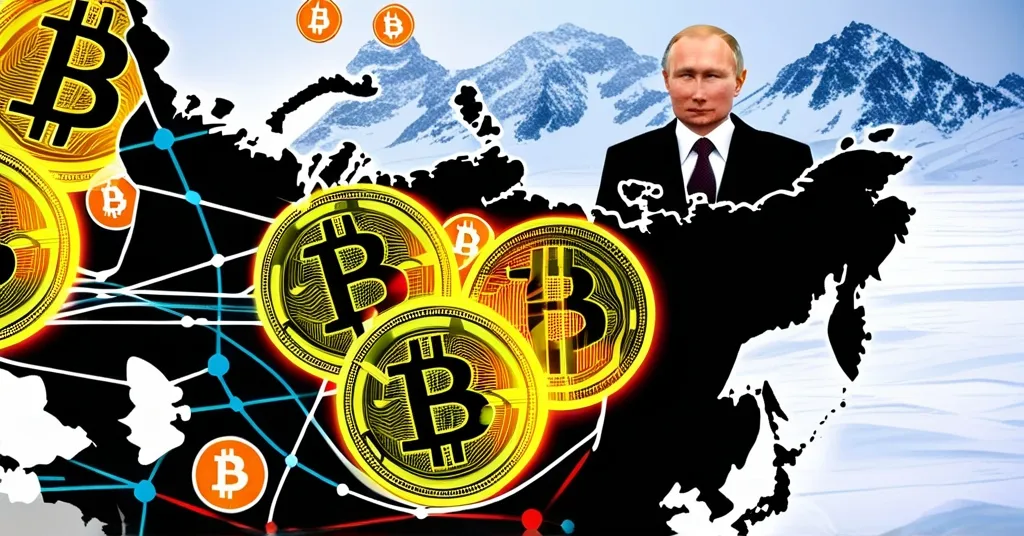Russia Embraces Bitcoin for International Trade Amid Sanctions and Mining Growth

Russia’s Bold Move: Embracing Bitcoin for International Trade
Russia has taken a transformative step by recognizing Bitcoin and other cryptocurrencies as legitimate tools for international payments. Amidst the heavy sanctions that have stifled traditional trade channels, this strategic pivot represents a significant evolution in global economic strategy, as confirmed by Finance Minister Anton Siluanov.
- Russia authorizes Bitcoin for international payments.
- Finance Minister Siluanov encourages broader crypto use.
- Russia ranks as the second-largest Bitcoin mining hub globally.
After years of erratic crypto policies, Russia has legalized both the mining of cryptocurrencies and their use for international payments. This shift comes as geopolitical tensions necessitate alternatives to conventional banking systems. Finance Minister Anton Siluanov has underscored the importance of expanding these crypto transactions to overcome economic barriers.
“Such transactions are already occurring. We believe they should be expanded and developed further.” – Anton Siluanov
President Vladimir Putin’s endorsement of Bitcoin as a rival to the U.S. dollar is a broader challenge to Western financial hegemony. By criticizing the dollar’s role as a political tool, Putin positions cryptocurrencies as a strategic asset in Russia’s economic playbook.
“No one in the world can regulate Bitcoin.” – Vladimir Putin
Russia’s edge in Bitcoin mining is fueled by its cheap electricity and cold climate, making it an ideal hub after the United States. In 2023, the nation mined 54,000 Bitcoins, yielding about $550 million in tax revenue. Yet, the burgeoning crypto activity faces obstacles. Excessive electricity consumption has led to regional mining bans, impacting areas like Dagestan and Chechnya, with seasonal restrictions in energy-demanding regions like Irkutsk.
Despite these challenges, Eastern Europe, spearheaded by Russia, processed an impressive $499 billion in on-chain crypto value from July 2023 to June 2024. This underscores the region’s expanding engagement with digital currencies, as countries navigate around global sanctions.
“The U.S. undermines the dollar’s role as a global reserve currency.” – Vladimir Putin
Russia’s strategic use of its resources for crypto mining could have profound implications for the global financial system. Employing cryptocurrencies to bypass sanctions may encourage other economically isolated nations to adopt similar tactics, potentially reshaping international trade dynamics.
Key Takeaways
- What recent changes has Russia made regarding cryptocurrency use?
Russia has legalized the use of Bitcoin and other cryptocurrencies for international trade and mining.
- Why is Russia turning to cryptocurrencies for international trade?
Due to heavy sanctions disrupting traditional trade channels, cryptocurrencies offer an alternative means of conducting international transactions.
- How has Russia positioned itself in the global Bitcoin mining industry?
Russia is now the second-largest Bitcoin mining hub globally, benefiting from cheap electricity and cold weather conditions.
- What challenges does Russia face with its increased crypto activities?
Significant electricity consumption has led to regional mining bans and seasonal restrictions in energy-heavy areas.
- What is President Putin’s stance on Bitcoin and the U.S. dollar?
Putin supports Bitcoin as a viable alternative to the U.S. dollar, which he criticizes as being used as a political tool by the U.S.
Russia’s embrace of cryptocurrencies marks a pivotal change in its economic strategy, showcasing the potential of digital assets to redefine global trade and financial frameworks. While hurdles persist, this proactive approach may signal a new era of financial independence and innovation.



